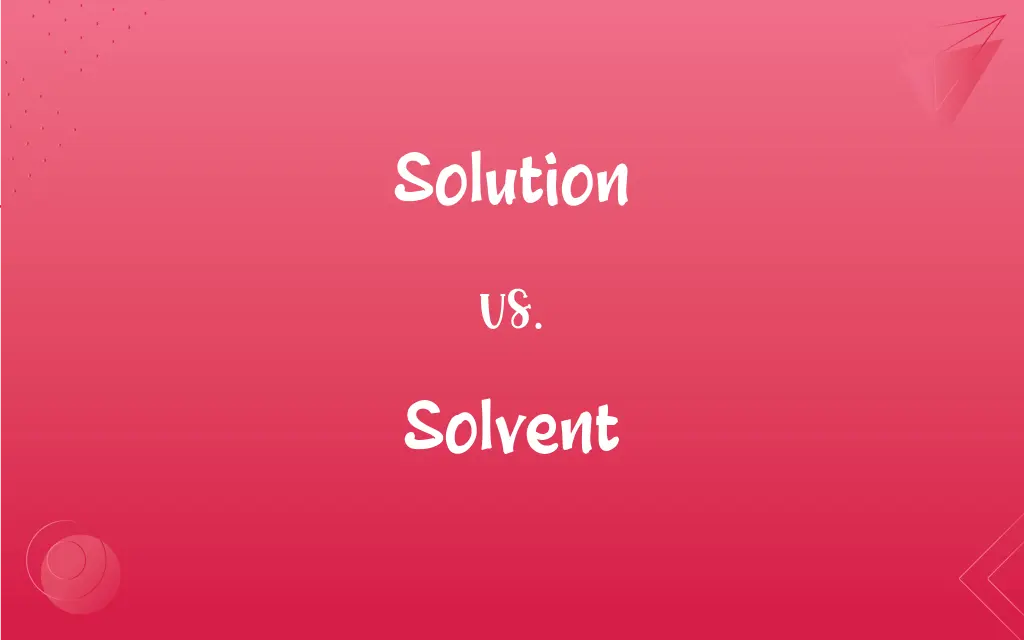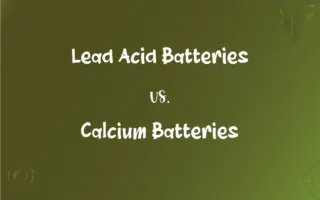Solution vs. Solvent: What's the Difference?
Edited by Aimie Carlson || By Harlon Moss || Published on January 28, 2024
A solution is a homogeneous mixture of two or more substances, whereas a solvent is the substance that dissolves the other substance(s).

Key Differences
A solution is a homogeneous mixture where one or more substances (solute) are dissolved in another substance (solvent). The solvent, on the other hand, is the component of a solution that is present in the largest amount and dissolves the solute.
Solutions are characterized by their uniform distribution of particles, meaning the solute is evenly dispersed within the solvent. Solvents are the substances that provide the medium for this dispersion, typically liquids, but can also be gases or solids.
In solutions, the physical state is determined by the solvent. For example, if the solvent is a liquid, the solution is liquid. The solvent's properties also largely dictate the solution's properties, like boiling point and freezing point.
The concentration of a solution is defined by the amount of solute dissolved in the solvent. The solvent’s capacity to dissolve a solute depends on factors like temperature and pressure.
Solutions play a critical role in various scientific and industrial processes, while solvents are selected based on their ability to dissolve specific solutes and their chemical properties.
ADVERTISEMENT
Comparison Chart
Definition
A homogeneous mixture of two or more substances
The substance that dissolves the solute
Role
Contains both solute and solvent
Dissolves the solute to form a solution
Quantity
Consists of solute and solvent in varying proportions
Usually present in a larger amount
Physical State
Takes the state of the solvent (liquid, solid, or gas)
Can be a liquid, solid, or gas
Examples
Saltwater, air
Water, alcohol
ADVERTISEMENT
Solution and Solvent Definitions
Solution
Solutions are characterized by their homogeneity.
A sugar solution is clear and uniform throughout.
Solvent
A solvent is a substance capable of dissolving other substances.
Water is a universal solvent due to its ability to dissolve many substances.
Solution
In a solution, the solute is evenly distributed within the solvent.
In a coffee solution, the coffee powder is the solute dissolved in water.
Solvent
The solvent determines the physical state of a solution.
In an alcohol-based hand sanitizer, alcohol acts as the solvent.
Solution
Solutions can be solid, liquid, or gaseous.
Air is a gaseous solution of various gases.
Solvent
Solvents are often liquids but can also be gases or solids.
Acetone, a liquid solvent, is used in nail polish remover.
Solution
The concentration of a solution refers to the amount of solute in a given amount of solvent.
A concentrated bleach solution contains a high proportion of bleach in water.
Solvent
Solvents can influence the properties of a solution like boiling and freezing points.
Ethanol, used as a solvent in thermometers, has a lower freezing point than water.
Solution
A solution is a uniform mixture of solute and solvent.
Salt dissolves in water to form a saline solution.
Solvent
The choice of solvent depends on its chemical compatibility with the solute.
Petroleum ether, a nonpolar solvent, is used to dissolve oils and fats.
Solution
A method or process of dealing with a problem
Sought a solution to falling enrollments.
Solvent
Capable of meeting financial obligations.
Solution
The answer to a problem or the explanation for something
The solution to the mystery.
Solvent
(Chemistry) Capable of dissolving another substance.
FAQs
What is an example of a liquid solution?
Salt dissolved in water to form saltwater is an example of a liquid solution.
What is a solution in chemistry?
A solution is a homogeneous mixture of two or more substances, typically a solute dissolved in a solvent.
Can solutions exist in different states?
Yes, solutions can be liquid, solid, or gaseous.
What is a solvent?
A solvent is a substance that dissolves a solute to form a solution.
How does a solvent affect a solution?
The solvent determines the solution's physical state and influences its properties.
What role do solvents play in everyday products?
Solvents are used in various products, from cleaning agents to pharmaceuticals, for their ability to dissolve other substances.
Are solvents always liquid?
No, solvents can also be solids or gases, though liquid solvents are most common.
What is meant by a saturated solution?
A saturated solution contains the maximum amount of solute that can be dissolved in the solvent at a given temperature.
Can the type of solvent change the solution's properties?
Yes, the chemical nature of the solvent can significantly affect the properties of the solution.
How is the concentration of a solution determined?
Concentration is determined by the amount of solute dissolved in a given quantity of solvent.
How does a solvent influence a chemical reaction?
The solvent can affect the rate and outcome of a chemical reaction by interacting with the reactants.
Are there environmentally friendly solvents?
Yes, there are eco-friendly solvents designed to be less harmful to the environment and human health.
Are all solvents safe for human exposure?
No, some solvents can be toxic or harmful and require careful handling.
What is an azeotropic solution?
An azeotropic solution is a mixture of liquids that maintains a constant boiling point and composition throughout distillation.
What is a non-aqueous solvent?
A non-aqueous solvent is any solvent other than water, used for dissolving substances that are not soluble in water.
Is water always the best solvent?
Water is a versatile solvent, but the best solvent depends on the solute's chemical properties.
What is a universal solvent?
Water is often called a universal solvent due to its ability to dissolve many different substances.
Can the solubility of a solute change with temperature?
Yes, solubility often increases with temperature, but this can vary depending on the substances involved.
Can solvents be recovered and reused?
Many solvents can be recovered and recycled, depending on their chemical properties and the processes used.
How does polarity of a solvent affect solubility?
The polarity of a solvent influences its ability to dissolve polar or nonpolar solutes.
About Author
Written by
Harlon MossHarlon is a seasoned quality moderator and accomplished content writer for Difference Wiki. An alumnus of the prestigious University of California, he earned his degree in Computer Science. Leveraging his academic background, Harlon brings a meticulous and informed perspective to his work, ensuring content accuracy and excellence.
Edited by
Aimie CarlsonAimie Carlson, holding a master's degree in English literature, is a fervent English language enthusiast. She lends her writing talents to Difference Wiki, a prominent website that specializes in comparisons, offering readers insightful analyses that both captivate and inform.































































